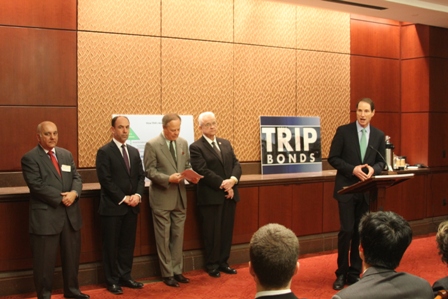Bipartisan Coalition of Lawmakers Urges Colleagues to Consider TRIP Bonds as an Additional Way to Fund Transportation Infrastructure Projects
The cost of tax-credit bonds to the government is a fraction of the cost of funding projects outright, they incentivize private investment in public projects that improve overall economic activity
Washington, D.C. – Following today’s Congressional Budget Office (CBO) announcement that the Federal Highway Trust Fund has a much deeper deficit than previously believed, a bipartisan coalition of lawmakers from both houses of Congress are urging their colleagues to look at tax credit bonding to fund important infrastructure projects. U.S. Senators Ron Wyden (D-Ore.) and John Hoeven (R-N.D.) and Reps. Leonard Boswell (D-Iowa) and Ed Whitfield (R-Ky.) have introduced legislation known as Transportation Regional Infrastructure Project (TRIP) bonds which would leverage public financing to fund transportation infrastructure projects in all 50 states.

(Pictured left to right: Jack Basso, Douglas Holtz-Eakin, Representatives Whitfield, Representative Boswell, Senator Wyden. Not pictured: Senator Hoeven)
At a press conference held today, the lawmakers were joined by current American Action Forum president and former- CBO director Douglas Holtz-Eakin and the Chief Operating Officer of the American Association of State Highway and Transportation Officials (AASHTO) Jack Basso, both of whom have endorsed tax credit bonding for transportation infrastructure projects.
TRIP bonds will provide private investors a federal tax credit in lieu of interest to incentivize an investment of $50 billion over six years at a cost to the government of just under $12 billion. The government alone is unable cover that cost. By leveraging readily available private capital, public transportation projects can go forward at a fraction of the cost to the federal government.
“In a political climate where budgets are being decreased, it is becoming harder and harder to find the funding needed to repair our crumbling infrastructure,” Wyden said. “However, private capital is often sitting on the sidelines just waiting to be invested. TRIP bonds leverages that money, injecting the economy with billions in new investment dollars to build infrastructure that will indirectly improve the economy even more.”
“TRIP Bonds are an efficient way to leverage private-sector dollars to build the infrastructure we need to grow America’s economy and create sustainable jobs,” Hoeven said. “We have bipartisan support for this effort and seek to do it in a way that incentivizes private investment, and pays for it within the federal DOT budget so that it doesn’t increase the deficit.”
“Tax credit bonds, like the TRIPs proposal, provide a fiscally conservative way to fund our nation’s infrastructure,” said current American Action Forum president and former CBO director Douglas Holtz-Eakin. “This is an innovative way to provide $50 billion in new infrastructure projects at the lowest cost to the taxpayer. It’s a bipartisan idea that can help create and sustain jobs by jumpstarting American infrastructure projects that will allow our nation to compete on a global scale.”
“Major national commissions and organizations like AASHTO and the American Society of Civil Engineers have documented the need to substantially increase our nation’s infrastructure investment,” said AASHTO Chief Operating Officer Jack Basso. “AASHTO supports TRIP bonds as an innovative way to bring additional funding to start to reverse the massive infrastructure funding deficit.”
“With millions of Americans still out of work and our infrastructure crumbling, TRIPs represent an opportunity to tackle both of these problems head-on, in a fiscally responsible manner,” said Whitfield. “By leveraging private sector dollars, we can create jobs and make the infrastructure investments needed to stay economically competitive now and in the future. I look forward to working with my colleagues in a bipartisan, bicameral fashion to advance this legislation as part of a long-term surface transportation reauthorization.”
“We have been neglecting our country’s roads, bridges, tunnels, railways and other infrastructure for far too long. Every year, the Highway Trust Fund is being depleted and projects are put on hold or eliminated entirely at the expense of the safety of the American people,” Boswell said. “We cannot continue to ignore structural deficiencies and risk another disaster like we witnessed with the Minneapolis I-35 bridge collapse. This truly bipartisan legislation will put millions of people to work and provide a much-needed boost to fixing our crumbling infrastructure without raising taxes and adding to the deficit.”
TRIP Bonds are tax credit bonds designed specifically to fund transportation infrastructure projects in all 50 states. The legislation allows state-based funding entities to sell these bonds to investors – offering them a tax credit instead of interest on the bond. This opens up the market for infrastructure bonds dominated by tax-exempt bonds to organizations and investment funds that are already tax-exempt like university endowments and will be an additional means of financing these projects that is popular on both sides of the aisle.
Click here for more information about how TRIP bonds work and to watch today’s press conference.
Related Files
Next Article
